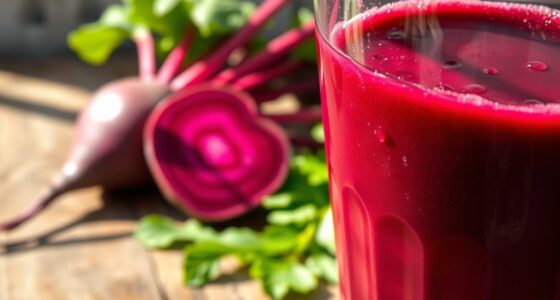Juicing gives you quick nutrient absorption and loads of vitamins, but it often lacks fiber, which can lead to blood sugar spikes. Whole fruits, packed with fiber, help regulate blood sugar and keep you feeling full longer. This makes them a great choice for weight management and digestive health. Each option has its place in your diet, and understanding their benefits can help you achieve your health goals. You'll discover more essential insights ahead.
Key Takeaways
- Juicing provides concentrated nutrients and antioxidants but lacks fiber, potentially leading to rapid blood sugar spikes.
- Whole fruits retain high fiber content, promoting stable blood sugar levels and longer-lasting satiety.
- Juicing simplifies digestion and nutrient absorption, making it beneficial for detoxifying or healing purposes.
- Whole fruits support digestive health and weight management due to their high fiber and low-calorie content.
- Combining both juicing and whole fruits can maximize nutrient intake while managing sugar levels effectively.
The Nutritional Value of Juicing
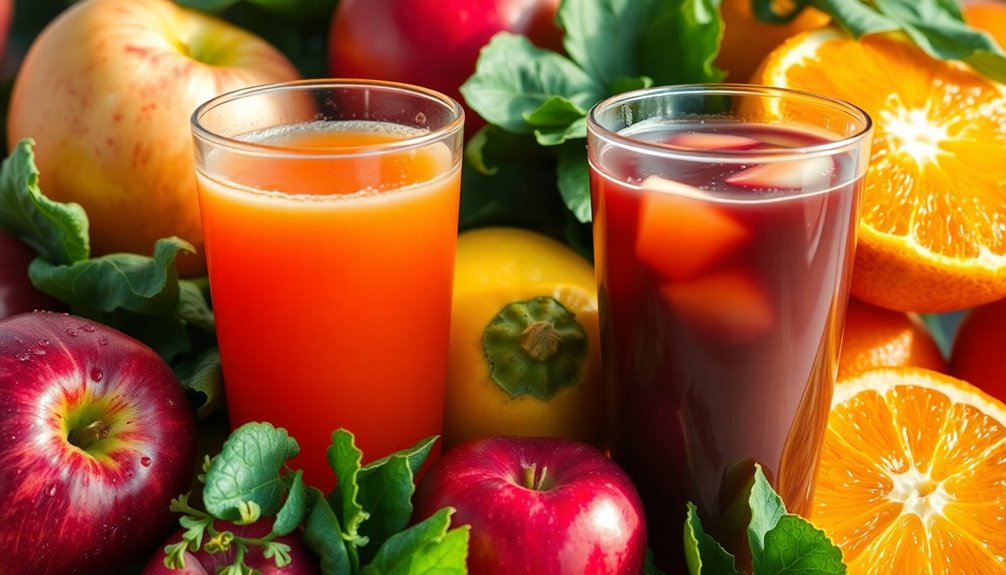
When you juice fruits and vegetables, you extract a concentrated dose of nutrients and water, making it easier for your body to absorb them quickly. Juicing retains many vitamins and antioxidants, offering notable health benefits. However, the process removes insoluble fiber, which can lead to spikes in blood sugar levels. This means that while your juice may be nutrient-rich, it can also cause energy loss and mood swings. Juices typically contain higher sugar levels than whole fruits, impacting your overall health if consumed excessively. They're often recommended for individuals detoxifying or healing, as they simplify digestion and support nutrient intake. Beet juice may enhance blood flow and provide additional health benefits, making it a great addition to your juicing routine. Balancing your diet rich in whole fruits alongside juice can help you harness the best of both worlds.
Whole Fruits: Benefits and Nutrients

Although many people turn to juicing for a quick nutrient boost, whole fruits offer a wealth of health benefits that shouldn't be overlooked. Packed with essential nutrients and fiber, whole fruits contribute greatly to your overall health outcomes.
The high fiber content helps slow sugar absorption, promoting stable blood sugar levels and keeping you feeling full longer. For instance, raspberries contain up to 8 grams of soluble fiber per cup, supporting digestive health and lowering cholesterol.
Plus, whole fruits are low in calories and high in water, making them excellent for weight loss and maintaining a balanced diet. Additionally, fresh ingredients enhance flavor and nutrition, providing even more reasons to incorporate whole fruits into your daily routine.
Juicing and Blood Sugar Management
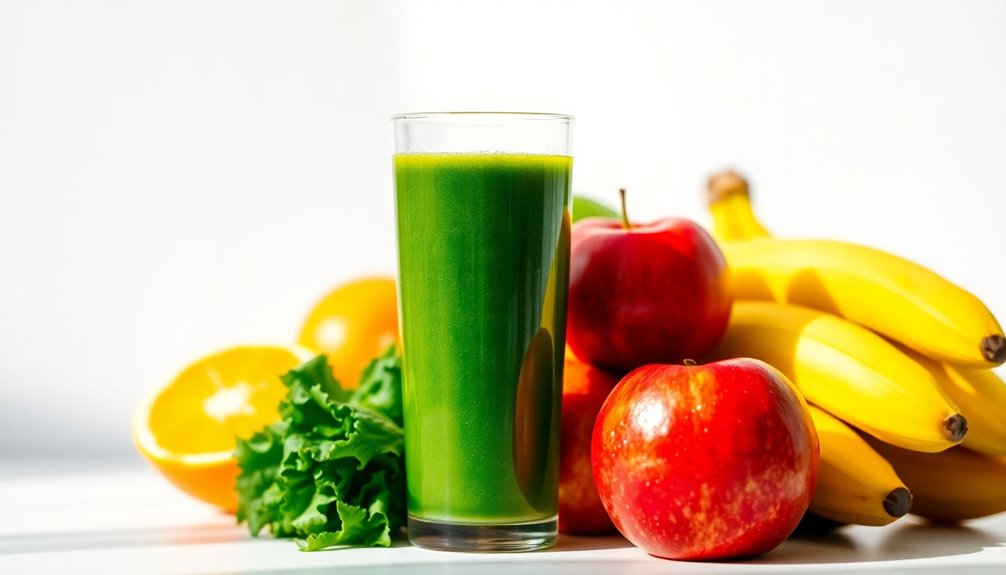
Juicing can be tempting for a quick energy boost, but it often leads to rapid blood sugar spikes that you might want to avoid.
Without the fiber found in whole fruits, your body absorbs sugar faster, which can result in energy crashes and mood swings. If you're managing blood sugar levels, consider these tips:
- Choose whole fruits over juice for fiber benefits.
- Limit juice intake, especially if you have insulin resistance.
- Opt for smoothies to retain fiber and promote slower digestion.
- Monitor how different fruits affect your blood sugar.
- Focus on healthy eating with a balance of fruits and vegetables. Additionally, coffee's health benefits suggest that incorporating low-calorie beverages can help manage overall sugar intake.
Fiber and Satiety: The Role of Whole Fruits
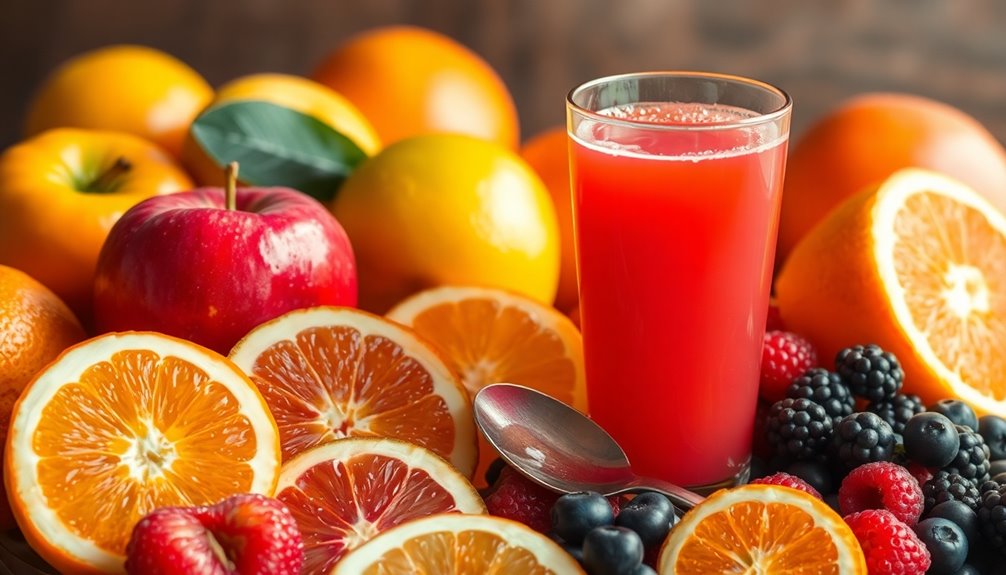
Whole fruits play a significant role in promoting satiety, thanks to their high fiber content. This dietary fiber slows sugar absorption, helping you maintain stable blood sugar levels and feel full longer.
For instance, a cup of raspberries packs about 8 grams of soluble fiber, enhancing digestion and reducing hunger. Unlike juices, whole fruits provide longer-lasting satiety, preventing quick returns of hunger.
The fiber also regulates appetite hormones, supporting weight management. Consuming whole fruits regularly can lower your calorie intake while supplying essential nutrients, which may decrease the risk of obesity and heart disease. Additionally, establishing good oral hygiene habits from a young age is crucial, as it contributes to overall health and well-being.
Choosing the Right Option for Your Health Goals
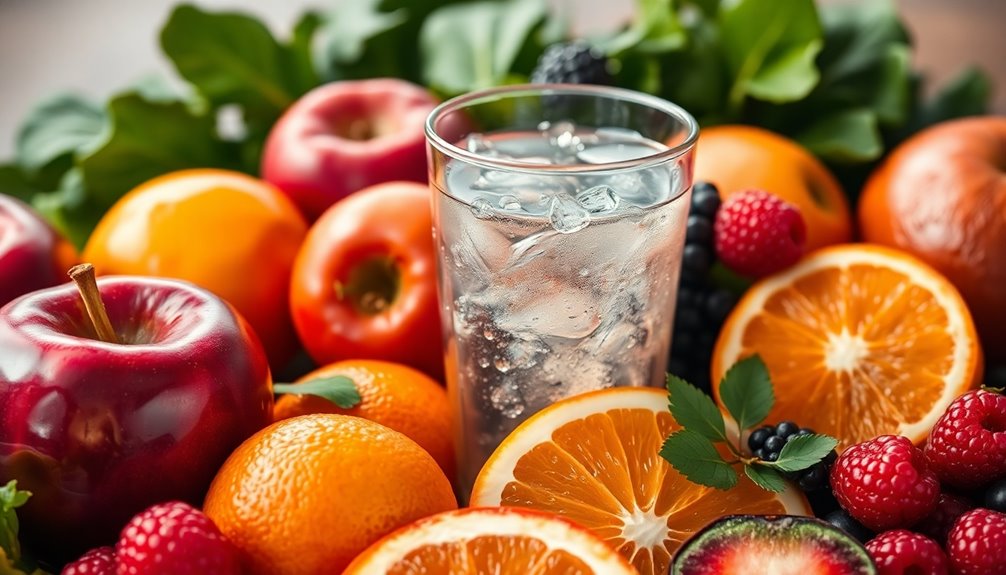
How do you decide between juicing and eating whole fruits to meet your health goals? It depends on your specific needs and lifestyle.
Consider these points when choosing:
- Nutrient Absorption: Juicing extracts nutrients quickly, great for rapid intake.
- Dietary Fiber: Whole fruits offer fiber, aiding digestion and prolonging satiety.
- Blood Sugar Levels: Be cautious with fruit juice; it can spike blood sugar.
- Meal Replacements: Blending fruits and vegetables can create a filling meal substitute.
- Balance: Combining both can enhance your nutrient intake while managing sugar levels. Additionally, cold press juicers retain more nutrients, making them an ideal choice for those seeking maximum health benefits.
Frequently Asked Questions
Is Juicing Healthier Than Eating the Fruit?
When you consider whether juicing is healthier than eating whole fruit, it’s important to weigh the benefits. While juicing can be a convenient way to consume a variety of nutrients quickly, it often lacks the fiber found in whole fruits, which is essential for digestive health. Additionally, the health benefits of juicing may vary depending on the types of fruits and vegetables used, as well as how they are prepared, making it crucial to consider the overall nutritional balance in your diet. Ultimately, incorporating both whole fruits and juices can offer a wider array of nutrients and health advantages.
Juicing offers quick nutrient absorption, which can be great if you have digestive issues. However, whole fruits provide essential fiber that slows sugar absorption, helping maintain stable blood sugar levels.
Plus, whole fruits keep you feeling fuller for longer. Overall, while both have their advantages, eating whole fruit often supports better long-term health.
Is Drinking 100% Fruit Juice the Same as Eating Fruit?
No, drinking 100% fruit juice isn't the same as eating whole fruit.
When you sip juice, you miss out on the fiber that helps slow sugar absorption and keeps you feeling full. Whole fruits pack in more antioxidants, vitamins, and minerals, which can be lost during juicing.
Plus, juice often contains more sugar and calories per serving, which can spike your blood sugar levels.
Why Is Juice Not as Healthy as Fruit?
Juice is like a beautiful painting missing half its colors; it lacks the crucial fiber found in whole fruits.
That fiber helps slow sugar absorption, keeping you full longer. Without it, you might find yourself hungry sooner.
Plus, juicing can strip away essential nutrients, leaving you with less energy and potential mood swings.
You're better off enjoying whole fruits, which provide balanced nutrition and help maintain steady energy levels throughout your day.
What Are 5 Cons of Juicing?
When considering the cons of juicing, you'll find several drawbacks.
First, juicing removes fiber, which can lead to quicker digestion and increased hunger.
Second, juices often contain high sugar levels without the fiber to slow absorption, causing blood sugar spikes.
Third, you might miss out on essential nutrients like potassium.
Fourth, juice diets can result in extreme calorie deficits.
Finally, relying solely on juices can disrupt your body's natural hunger cues, complicating your diet.
Conclusion
In the debate of juicing vs. whole fruits, the truth lies in balance. While juicing can provide a quick nutrient boost, it often lacks the fiber that whole fruits offer, making you feel full longer and helping manage blood sugar. If your goal is to maximize health benefits, consider incorporating both into your diet. Experiment with what works best for you, and you'll discover that each option has unique perks worth enjoying!
Susannah expertise lies in researching and compiling evidence-based content on juicing, nutrition, and overall health. She is committed to ensuring that The Juicery World offers accurate, up-to-date, and trustworthy information to empower readers to take control of their health. Susannah’s goal is to inspire individuals to embrace juicing as a way to nourish their bodies and live their best lives.













